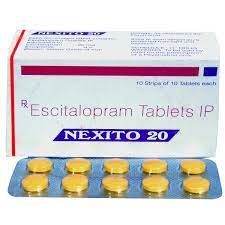Cilapam 20 Tablet
Cilapam 20 Tablet is an antidepressant medication used to treat depression and various anxiety disorders. It functions by balancing serotonin levels in the brain, a neurotransmitter critical in regulating mood. By increasing serotonin levels, the drug aids in improving mood and alleviating symptoms associated with depression, anxiety, panic attacks, and obsessive compulsive disorders. Its role is to create a more stable chemical environment in the brain, fostering emotional wellbeing. Adherence to prescribed usage is essential for effectively managing mental health conditions and promoting overall mental balance.
It belongs to the class of medications called selective serotonin reuptake inhibitors (SSRIs). It's prescribed to address depression and a range of anxiety disorders, including generalized anxiety disorder, panic disorder, and obsessive compulsive disorder.
The medication works by increasing the levels of serotonin in the brain. Serotonin is a neurotransmitter that plays a vital role in regulating mood. By enhancing serotonin levels,. It helps in improving mood and reducing symptoms associated with various mental health conditions.
Follow your doctor's instructions regarding dosage and duration. You can take this medicine with or without food, but maintaining a consistent time daily is recommended for better results.
Some common side effects of this include anorgasmia, decreased libido, delayed ejaculation, fatigue, increased sweating, insomnia, nausea, and sleepiness.
Immediate medical attention should be sought if sudden mood shifts or suicidal thoughts arise. Avoid abruptly discontinuing the medication and consult your doctor before altering the dosage. Be vigilant for signs of serotonin syndrome, such as agitation, hallucinations, and rapid heartbeat.
If a dose is missed, take it as soon as possible. However, do not double the dose if it's close to the time for the next scheduled dose.

Similar Medicines
More medicines by Alteus Biogenics Pvt Ltd
Related Faqs

Is Cilapam better taken at night or in the morning?
Cilapam is typically advised to be taken once daily in the morning to avoid any potential sleep disturbances if consumed late at night It can be taken with or without food providing flexibility based on personal preference or dietary restrictions It is highly recommended to establish a consistent routine of taking Cilapam at the same time every day to ensure regularity and minimize the risk of forgetting a dose This approach helps maintain the medications efficacy and ensures a steady concentration of the active ingredient in the body optimizing its therapeutic effects By adhering to a specific daily schedule it becomes easier to incorporate Cilapam into your routine and remember to take it consistently Remember it is essential to follow your doctors instructions and consult with them if you have any concerns or questions about the administration of Cilapam or its optimal timing for your unique circumstances

Can I stop taking Cilapam on my own?
It is extremely important to refrain from abruptly ceasing the use of Cilapam as doing so may result in the onset of withdrawal symptoms Although these symptoms are usually mild and generally dissipate within a twoweek period it is highly recommended that you do not discontinue the medication without seeking advice from your healthcare provider It is best to consult with your doctor who can assist in gradually reducing your dosage By consulting a healthcare professional you will ensure a smoother transition and minimize the potential risk of experiencing withdrawal symptoms It is crucial to prioritize your health and wellbeing by seeking proper guidance throughout this process Avoid any impulsive decisions and instead opt for a responsible and cautious approach under the supervision of a medical expert Remember your doctor is there to support you and ensure your safety and comfort during this medication adjustment

Is Cilapam better taken at night or in the morning?
The general recommendation for Cilapam is to ingest it once daily preferably in the morning as it might interfere with sleep if consumed late at night It can be taken with or without food depending on personal preference To ensure consistency in the medication routine it is advised to take Cilapam at the same time every day This not only aids in establishing a habit but also serves as a reminder to adhere to the prescribed dosage Following these guidelines will optimize the effectiveness of Cilapam and contribute towards maintaining a steady therapeutic level in the body As with any medication it is essential to consult a healthcare professional for personalized advice regarding dosage timing and any potential interactions with other medications or underlying medical conditions By adhering to the prescribed regimen individuals can maximize the benefits of Cilapam and promote their overall wellbeing

What is Cilapam used for?
Cilapam is a medication prescribed for the treatment of various mental health conditions such as depression and anxiety disorders It is commonly used to alleviate symptoms associated with social phobia anxiety disorder panic attacks and obsessivecompulsive disorder Depression is a mood disorder characterized by feelings of sadness lack of interest or pleasure in activities and changes in appetite and sleep patterns Cilapam functions by restoring the balance of certain chemicals in the brain known as neurotransmitters which are responsible for regulating mood By enhancing the levels of neurotransmitters like serotonin Cilapam helps to improve mood and alleviate depressive symptoms Anxiety disorders on the other hand are characterized by excessive worry fear and a constant feeling of unease Cilapam helps to reduce anxiety by blocking the reabsorption of serotonin allowing for increased levels of this neurotransmitter in the brain This action helps to calm the mind and reduce the intensity of anxiety symptoms Additionally Cilapam is also effective in managing panic attacks which are sudden episodes of intense fear and physical discomfort By regulating neurotransmitter levels it helps to diminish the frequency and severity of panic attacks providing relief to individuals suffering from this debilitating condition Cilapam has also been found to be helpful in treating obsessivecompulsive disorder OCD a chronic condition characterized by obsessive thoughts and repetitive behaviors By altering neurotransmitter activity in certain brain regions Cilapam helps to reduce the frequency and intensity of obsessive thoughts as well as the urge to perform compulsive behaviors It is important to note that Cilapam should be taken under the guidance of a healthcare professional as they can determine the appropriate dosage and monitor its effectiveness Additionally they can provide valuable guidance and support throughout the treatment process

Is Cilapam better taken at night or in the morning?
It is typically advised to consume Cilapam once daily in the morning to avoid any potential sleep disturbances if taken later in the evening Whether you decide to take it with or without food is entirely up to you However establishing a consistent routine by taking it at the same time each day can help ensure you dont forget to take your medication By adhering to this practice you can effectively manage your Cilapam dosage and maintain its therapeutic benefits Remember that individual preferences can vary so it is essential to consult with your healthcare provider for personalized guidance on the most suitable timing and administration of Cilapam based on your specific needs and medical condition Following their expert advice will help optimize the effectiveness of your treatment and promote your overall wellbeing

Can I stop taking Cilapam on my own?
It is strongly advised not to abruptly discontinue the use of Cilapam as this may result in the onset of withdrawal symptoms Although these symptoms tend to be relatively mild and typically subside within a period of two weeks it is important to seek guidance from a healthcare professional before discontinuing the medication Instead of stopping Cilapam without medical supervision it is recommended to consult with your doctor who can gradually reduce the dosage and monitor any potential adverse effects By following this approach you can ensure a smoother transition and minimize the risk of experiencing any withdrawal symptoms Your doctor will be able to provide personalized guidance based on your specific circumstances and medical history ensuring that you are able to discontinue Cilapam safely and effectively
Disclaimer : This information is not a substitute for medical advice. Consult your healthcare provider before making any changes to your treatment . Do not ignore or delay professional medical advice based on anything you have seen or read on Medwiki.
Cilapam 20 Tablet
Prescription Required
Packaging :
strip of 10 tablets
Manufacturer :
Alteus Biogenics Pvt LtdComposition :
Escitalopram Oxalate (20mg)















.svg)
